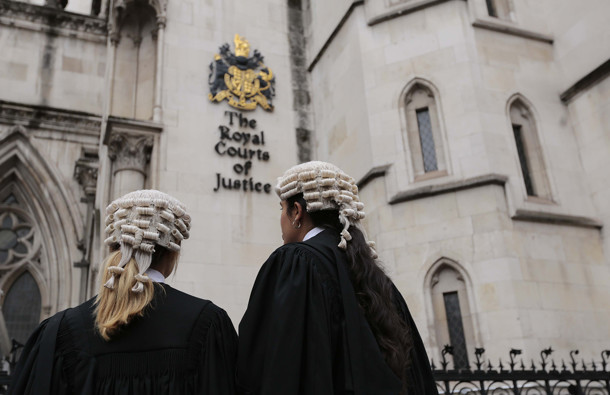
Will Generative AI Lead to Job Cuts?
March 16, 2024
An Interview with Ayse, a Solicitor Apprentice at an International Law Firm
March 17, 2024In this article, Diya Gupta interviews Gareth Rees; a practising member of the Bar with over forty years of experience including as former Director of Enforcement at the Financial Reporting Council (FRC) and a former partner at two US law firms. Gareth provides a snapshot of his varied roles, the transformation the legal industry has seen and his key takeaways at this stage in his career.
Please could you tell us a little bit about how your legal journey began and why you decided to pursue a career in law? What attracted you towards the Bar and criminal and fraud cases in particular?
A law qualification is still just as relevant now as it was 50 years ago, but the situation was rather different in the 1979 when I passed the Bar exams. Firstly, there were a much smaller number of people qualifying to be barristers and the profession was mainly populated by public school boys, as entry to the Bar was still too dependent on your contacts.
But things were changing at that time for publicly funded work, including crime, because there was a transformation with the availability of legal aid which meant that many people had access to legal advice and representation. By the 1990s, the criminal bar had expanded, and it became a reasonably lucrative career choice. I should note as well in that period that the coming into force of the Police and Criminal Evidence Act 1984 had an enormous impact and modernised police powers and the treatment of suspects for the benefit of everyone involved in the criminal justice system.
After a short period as a journalist, I began practice in crime, which meant that within 10 years I was dealing with more serious cases often as a junior in homicide prosecutions and in high-profile cases such as the Brinks Matt Robbery. But I was increasingly drawn to the increase in financial crime with a greater focus on money laundering, bribery and insider dealing. The SFO was now an active prosecuting agency and I was often defending in those cases. In 2003 I took Silk, and I began to focus on large-scale fraud trials which were often at Southwark Crown Court, with murder cases only accounting for about 20% of my practice.
Why did you decide to join the FRC, given your well-established position as a barrister?
I was initially instructed to act for the FRC on a case and around the same time the role of Executive Counsel (which became the Director of Enforcement) came up, which would involve investigating and prosecuting accountants who were responsible for preparing financial statements for large companies as well as the auditors. The important factor was that we were looking at cases that affected the UK public interest.
So why did I decide to take this left-turn away from the bar? By 2012, I was in my mid 50s and most barristers at that stage in their professional life have only one real choice to make; stay at the Bar or take a job as a judge. I felt lucky to have this opportunity because becoming a judge had never appealed to me. I wanted a new challenge and decided to join the FRC. In many ways I was still using all the same legal skills, but I now had to run a team and be part of a large organisation. This included hiring people, sitting on committees, reporting to the FRC Board and building a team who were capable of investigating and, if need be, prosecuting organizations like the Big Four accountancy firms.
Taking an averse position to the Big Four accountancy firms was a real challenge because they are powerful and sophisticated, but we had good resources available to us and I enjoyed being involved in this regulatory litigation.
In your opinion, what is your legacy/the main change you brought during your tenure as Director of Enforcement?
I arrived in 2012 and I was starting from scratch in many ways because the team was small and not able to manage what we needed to do. But some of the team were excellent and we hired some very good lawyers and accountants who helped us to build some respect for the work we were doing. The thing that I am most proud of is that I built that team. We were able to do this relatively quickly and in 2016, we were successful in three audits cases all involving the Big Four.
This was really important, not because we won but because it gave us some credibility as an enforcement body and it changed the attitude of the Big Four. I can’t point scientifically to what happened, but I think that there was a realisation that where the standard of the audit wasn’t sufficient then it may be that a settlement with the FRC may be a better option than the greater expense and delay caused by fighting the issue before an FRC Tribunal.
We certainly made some mistakes along the way, but I think we created an enforcement team which I believe is still an effective regulator and is part of a wider enforcement landscape.
What is your view on the direction that many regulatory bodies are moving in, with many critics arguing that overly harsh scrutiny is dissuading individuals from entering certain professions, such as audit?
This is an excellent question and something that is often echoed by auditors and large financial organisations. There is a real conflict because the firms and many people in the industry, whether it’s the accounting industry or the medical industry or any other industry, would say we might make mistakes, but having incredibly robust enforcement with big fines and directly affecting individuals’ careers is not the way to deal with it. Instead, regulatory bodies should be working together with us and helping us to see where we’ve got it wrong, so that we can get it right in the future. The current system is counter-productive. As your question implied, this type of enforcement can frighten people off to the extent that they do not want to enter such an industry because of the potential career-threatening consequences of making any errors and facing sanctions following enforcement action.
In response, I used to say to the Big Four that this wasn’t my decision. I don’t make the rules – it is increasingly the government and Parliament who decide that they want to have strict rules of enforcement and from our perspective, if the rules are there and we have clear evidence that they have been breached then we have a responsibility to do something about it. The debate was therefore always getting the balance right, whether it’s at the FCA or at the FRC. That debate continues.
This was particularly difficult and controversial because almost nothing had happened in the past and the regulation of the audit industry really didn’t exist before 2006, with minimal progress being made by the time I assumed my role as Executive Counsel in 2012. There are going to be cases where accountancy firms are going to get it badly wrong and they must accept that if a company collapses and there’s a lot of publicity and concern about it, we will have to act. Recently, this was the case with Carillion.
In the last few years, you worked at two US law firms – what stood out about them that triggered your move into a more traditional private practice role?
I stayed on at the FRC until 2017, but by this point I was over 60 years old and had to decide where my career was going, having taken one left turn in becoming a regulator. I could have gone back to the Bar but many of my friends who are solicitors were now working for US law firms and although I was a barrister, I was interested in the possibilities. I spent some time at King & Spalding LLP and then moved onto Morrison Foerster LLP, and I was involved in some very important global investigations which involved a lot of travel to Asia, Europe, the Middle East and the US. I would never have had such an experience at the Bar and I am very glad I was offered these roles.
A very small percentage of barristers go off and take the type of roles that I did. It is of course possible to shift and work for solicitors and the earlier you do it, the easier it is to learn the way in which solicitors’ firms operate and all the rules and the procedures. In terms of my experience at these firms, having practiced as a barrister for so many years and being relatively late in my career, there were just certain things that I didn’t know, whereas junior solicitors knew it inside out because they had been trained to learn it from the start. It isn’t ideal or perfect, but it was an interesting challenge given that when I started 40 years ago, a barrister would be breaching their professional conduct rules by going into a solicitor’s office. The division between the Bar and solicitors was so strict that any socialisation – even taking a solicitor out for lunch – could land you in trouble.
Having recently returned to the Bar, what are your aspirations for the next few years and what element of this position drew you back in?
In terms of moving back to the Bar, this was an easy decision for me. Upon reaching the age of 65, even US law firms expect you to retire and as a partner there are certain expectations in relation to billable hours, such that you get to a point where you want to balance your life differently. I realised that I wanted to stop being a partner and I was lucky to be able to retire from MoFo on the best possible terms.
Returning to the Bar was an easy decision as it is a wonderful part of the legal profession where I have still got many friends who I have known for decades. I can continue to practise but without the demands of a large law firm.
In many ways it is my comfort zone and I have an open mind as to how it might go. I am excited about the possibilities so I will have to report back in a few years!
Traditionally, the legal industry (and the Bar specifically) has been labelled as incredibly inaccessible, have you ever experienced this? And to what extent are barriers to entry lower than when you began practising?
It has totally changed. During the 1980s, pupillage candidates would predominantly be judged on the school and university they went to. Over time, Diversity and Inclusion policies have been implemented, certainly increasing the number of women who qualify. The image of judges that you see on television or in films was the reality when I started. I am delighted to hear that there are now more women judges at the Old Bailey than men – that is an extraordinary change.
One of the main issues that women face in any industry is maternity leave as it inevitably has an impact on their career in comparison to their male peers, given that they are away for a year or so. This remains a problem, but I think everyone is doing their best to find ways to ensure this is not an issue. Today, the number of women qualifying into the Bar and as solicitors is approximately equal to men, but then when you look at the proportion of those who reach partner level or take Silk, they are outnumbered. I am not sure what the answer is to this, but we need to make sure that we remove as many barriers as possible.
Beyond this, the Bar has definitely become more diverse – both the practitioners and the judiciary – and I am sure that this will continue to change for the better. Importantly though, there is another substantial problem at the publicly funded Bar. Whilst it is easier to get in regardless of your background, the real problem now is that fees have been reduced for legal aid which means that many have turned to other areas of work. I have heard from many colleagues that if you don’t have a wealthy family or another source of income, it will be a struggle to cut it at the Criminal Bar as it is exceptionally costly to live in central London on the fees you receive. Additionally, the fact that there are far more qualified students than chambers offering pupillage at the Bar means that a lots of young lawyers are discouraged and fail to qualify. Once you have completed your legal studies, you need to get a pupillage within four years or risk starting all over again (this has now increased to five years). This really needs to be managed and I saw this first-hand whilst at the FRC. There was a fantastic young lawyer who was working at the FRC who was in this exact situation, therefore we decided to introduce pupillages and trainee solicitor roles; fast-forward eight years and she is now General Counsel at a well-known financial firm.
There is also the continuously rising expense of taking the LPC/SQE or the Bar course. In consideration of all of these factors, qualifying as a lawyer is undeniably challenging and one has to be prepared for it.
It is very common for lawyers to have their preference with regards to acting for defendants or claimants – do you have an inclination either way?
I have prosecuted as a barrister and of course solely prosecuted at the FRC, but I do enjoy defending. Ultimately, it is part of the training and experience you get as a lawyer to have the skills to tackle either. Whether it is civil litigation, criminal litigation, or regulatory litigation, you learn to follow the law and fight as best as you can according to the evidence you are presented with. The rules and procedures should mean that the right outcome will emerge and justice prevails, but in reality, very few criminal barristers worry about whether their client is guilty or innocent. This is encapsulated by Shakespeare in The Taming of the Shrew where a character said, “do as adversaries do in law, strive mightily, but eat and drink as friends.” This is perfect in summarising exactly what happens: as lawyers, we do everything we possibly can and try to undermine our opponent’s case within the rules, but afterwards we leave court and go off as the best of friends – usually!





